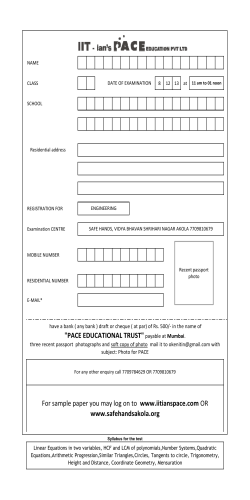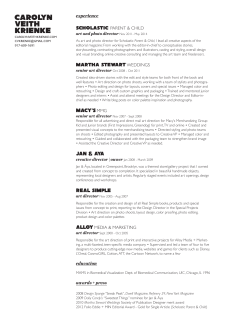
Photogrammetry
Photogrammetry Quantitative Measurements from Aerial Photography Flightlines of Vertical Aerial Photography Stereoscopic Vision and Stereoscopes Photo Alignment for 3D Visualization Orthophotographs and DEMs Reminder: Read Chapter 7 (pp. 193-218) for next class http://www.dailymotion.com/video/xc4ixx_weather man-freaking-out-over-dc-sno_shortfilms What Quantitative Measurements can be obtained from a Single Vertical Aerial Photograph? Scale Object length Area of photography or feature Perimeter of feature What Quantitative Measurements can be obtained using Overlapping Stereoscopic Aerial Photographs Precise planimetric locations Precise object height Planimetrically accurate orthophotographs Digital Elevation Models (DEMs) Slope and aspect derived from DEMs Flightline of Vertical Aerial Photography Flightline of Aerial Photography Direction of Flight Exposure station #1 #2 #3 lens altitude above ground level, H 60% overlap stereoscopic model Coverage of photograph terrain recorded on three successive photographs Jensen, 2000 Block of Vertical Aerial Photography Block of Aerial Photography Flightline #1 oblique ph otography may be acquired at th e end of a flig htlin e as the aircraft banks to turn Flightline #2 20 – 30% sidelap Flightline #3 Jensen, 2000 Block of Vertical Aerial Photography Compiled into an Uncontrolled Photomosaic Columbia, SC Original scale = 1:6,000 Focal length = 6” (152.82 mm) March 30, 1993 Jensen, 2000 Flightline #4 Photo #5 Columbia, SC Original scale = 1:6,000 Focal length = 6” (152.82 mm) March 30, 1993 Jensen, 2000 Line of flight Geometry of Overlapping Vertical Aerial Photographs Photo 2 y - axis Photo 1 Fiducial mark x-axis • Principal Points Principal Point of Photo #2 PP Principal Point of Photo #1 PP1 2 a. b. Photo 2 Photo 1 • Conjugate Principle Points PP1 CPP2 PP2 CPP1 line of flight Principal Point of Pho to #1 equals Conjugate Principal Point of Photo #2 c. Prin cip al Poin t of Pho to #2 equals Conjugate Principal Point of Photo #1 60% overlap stereoscopic model Jensen, 2000 Geometry of A Vertical Aerial Photograph Obtained Over Flat Terrain Geometry of A Vertical Aerial Photograph Collected Over Flat Terrain Jensen, 2000 Enlargement of A Portion of Flightline #4, Photo #5 Jensen, 2000 Geometry of A Vertical Aerial Photograph Collected Over Variable Relief Terrain Jensen, 2000 Measurement of Object Height From A Single Aerial Photograph Based on Relief Displacement Jensen, 2000 Measurement of Object Height From A Single Aerial Photograph Based on Shadow Length on Level Terrain Meas urement of the Height of Objects Bas ed on Shadow Length tan a = = oppos ite Su n's ra y adjacent height, h s hadow, L s h a h = L x tan a s hadow L Jensen, 2000 Stereoscopic Vision What is stereoscopic vision and what is its significance for remote sensing? Stereoscopic Vision 3-D effect occurs when an object is viewed from two different, but overlapping, viewpoints Human eyes – up to ~1,000 m Aerial photography – two successive aerial photos with at least 60% forward overlap will provide stereoscopic aerial photography Basis for 3-D effect 0.119” 59.1’ Parallactic Angles Used During Depth Perception Jensen, 2000 Stereoscopic Viewing Methods Jensen, 2000 Stereoscopes Deflect our normally converging lines of sight so each eye views a different image Lens (pocket) stereoscope Reflecting stereoscope Zoom stereoscope Stereoplotters Photo Alignment Identify principal point of each photograph Locate conjugate principal point (or point(s) that corresponds to principal point on adjacent photos) Align points with flight line (straight line) Line of flight Geometry of Overlapping Vertical Aerial Photographs Photo 2 y - axis Photo 1 Fiducial mark x-axis • Principal Points Principal Point of Photo #2 PP Principal Point of Photo #1 PP1 2 a. b. Photo 2 Photo 1 • Conjugate Principle Points PP1 CPP2 PP2 CPP1 line of flight Principal Point of Pho to #1 equals Conjugate Principal Point of Photo #2 c. Prin cip al Poin t of Pho to #2 equals Conjugate Principal Point of Photo #1 60% overlap stereoscopic model Jensen, 2000 Lens Stereoscope with Parallax Bar Jensen, 2000 Stereoscopic Parallax Principles Jensen, 2000
© Copyright 2026









